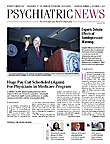Physicians participating in the Medicare program will face an across-the-board decrease in payment of 21.2 percent on April 1, 2015, unless Congress acts—as it has repeatedly in the past—to suspend the pay cut and enact a short-term payment “patch.” Another option is to permanently reform the payment formula and the Sustainable Growth Rate (SGR) component, a goal APA and the House of Medicine are committed to achieving.
The 2015 Medicare Physician Fee Schedule, released by the Centers for Medicare and Medicaid Services on October 31 as a final rule, updates payment policies and rates for services furnished by physicians in the Medicare program beginning January 1, 2015. The current Medicare “conversion factor” through March 31, 2015, is $35.8013; unless Congress intervenes, starting April 1, 2015, the conversion factor—which is used in a formula that includes work values and practice-expense costs to establish a fee for every code used by physicians—will be $28.2239 under the newly released fee schedule.
(Staff in APA’s Division of Government Relations said that while incoming Republican leadership has indicated a desire to address SGR repeal and physician payment reform, it is too early to predict how debate or legislative activity will take shape. The cost of repeal of the SGR—from the accumulation of yearly mandated pay cuts that have been deferred by Congress each year for a decade—ranges between $130 billion and $180 billion.)
The fee schedule also contains a number of other provisions affecting payment, physician quality reporting, use of telemedicine codes, and chronic-care management. Most prominently, the fee schedule enacts some revisions and refinements to the “value-based modifier” mandated by the Affordable Care Act (ACA).
The ACA establishes a value payment modifier that rewards or penalizes a physician or group of physicians based on the “value” of service provided, as calculated by a formula that includes quality and cost of care. Further, the statute requires CMS to begin applying the value modifier on January 1, 2015, and to apply it to all physicians and groups of physicians beginning no later than January 1, 2017. The statute requires that the value modifier must be implemented in a budget-neutral manner, generally meaning that positive payment adjustments for high performance must balance the negative payment adjustments for poor performance.
In 2017, CMS will apply the value-based payment modifier, based on 2015 reporting, to all physicians regardless of group size—including solo practitioners. For groups with two to nine eligible professionals or for solo professionals, CMS will apply a maximum cut of 2 percent if they do not meet the quality reporting requirements of the Physician Quality Reporting System (PQRS). But for groups with 10 or more eligible professionals, the amount of payment at risk is increased to 4 percent. That means that physician groups of 10 or more are subject to a 4 percent cut if they do not meet the quality reporting requirements of the PQRS.
All participating physicians will be subject to three sets of rewards or penalties: “meaningful use” of electronic health records, performance on quality measures in the PQRS, and the value-based modifier (which includes performance on the PQRS as part of its formula).
Under the fee schedule, CMS is adding 20 new individual measures and two group measures to the PQRS to fill existing measure gaps. CMS removed 50 measures from reporting for the PQRS. Therefore, the 2015 PQRS individual measure set totals 255 measures. Generally, physicians need to report only nine measures covering three National Quality Strategy domains.
Also of potential importance to participating psychiatrists, the administration has finalized a policy in the fee schedule regarding chronic care management (CCM). In the 2014 final rule, CMS established policy to make separate payment for non-face-to-face CCM services for Medicare beneficiaries who have multiple, significant chronic conditions. CCM services include regular development and revision of a plan of care and communication with other treating health professionals.
CMS finalized a payment rate of $42.60 for CPT code 99490, which can be billed once a month per patient once the threshold of 20 minutes of care coordination activity has been reached. CMS will pay one provider per patient per month for this service and requires patients to be made aware prior to the first bill of the service and copayment. Rather than use the proposed G-code, CMS will use CPT code 99490.
Finally, the fee schedule revises provisions about use of telemedicine codes so that beginning in January, psychiatrists can bill for psychoanalysis, family therapy (both with and without the patient), and prolonged E/M services (CPT codes 99354 and 99355). ■
APA members can click
here for comprehensive information about the fee schedule, including a flow chart illustrating how the various components can combine to affect physician payment. More information on PQRS is available
here. The fee schedule can be accessed
here. A CMS fact sheet about the fee schedule is posted
here.
